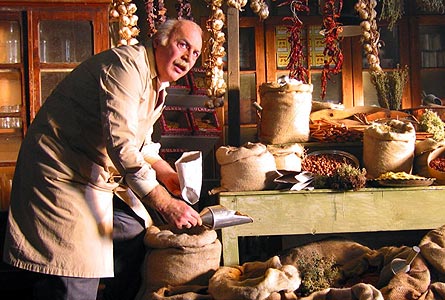Film epic helps put Greek cinema back in the frame
A Touch of Spice knocks US blockbusters off top of bill
Fiachra Gibbons, arts correspondent in Salonika, Guardian
They cringed at My Big Fat Greek Wedding, quietly fumed at Captain Corelli's Mandolin, and have grown heartily sick of the theme tune from Zorba, but after decades starved of a major international hit, Greek cinema is finally celebrating a film of its own which looks set to be a world beater.
A Touch of Spice, a bitter-sweet epic about the travails of the embattled Greek minority in Istanbul, has knocked American blockbusters such as Pirates of the Caribbean from the top of the box office in Athens.

In a little over a fortnight it has sold 700,000 tickets, putting it on course to be the biggest Greek film of all time, and forcing Hollywood to sit up and take notice of a film being billed as the Mediterranean answer to Like Water For Chocolate.
Like the Mexican cult hit, A Touch of Spice is about cooking and family, but packs a historical and emotional punch that leaves you weak at the knees.
Even in Greece, the story of the 30,000 Greeks who were in effect deported from Istanbul in 1964 is something of an untold story. Which is why director Tassos Boulmetis, whose family was uprooted from the city that was its home for countless generations, decided to tell their story after making a painful return to his childhood home.
Made partly in Turkey, and starring one of its best-known actors, the film is also being seen as a part of the slow and uneasy rapprochement between the two enemies who have spent most of the last 80 years perched on the precipice of war.

The film confronts prejudice in both countries. Boulmetis, whose family was thrown out of the city Greeks still call Constantinople when he was seven, claimed: "We left Turkey as Greeks and we were greeted here as Turks. We were caught in the middle, confused and ill at ease in a homeland that wasn't really our home."
Unwelcome among Greek officialdom as the country plunged into military dictatorship, in the film the family clings to the traditions and most of all the cooking of the old Byzantine capital, now home to fewer than 2,000 Greeks.
The son, based on Boulmetis himself, finds himself a job as a cook in a brothel when his family bans him from the kitchen in an attempt to turn him into a "proper Greek".
 "It took me a long time to realise it but I did not really feel whole until I went back to Istanbul. Going back changed my life," he said. "As a seven year old I spoke fluent Turkish, but in the trauma of leaving I lost it. I went to our old house in Kadikoy on the Asian shore of the Bosphorus. But I couldn't bring myself to ring the bell. Just going back changed my life."
"It took me a long time to realise it but I did not really feel whole until I went back to Istanbul. Going back changed my life," he said. "As a seven year old I spoke fluent Turkish, but in the trauma of leaving I lost it. I went to our old house in Kadikoy on the Asian shore of the Bosphorus. But I couldn't bring myself to ring the bell. Just going back changed my life."
But one of his actors, Tassos Bandis, another Istanbul Greek who plays his grandfather in the film, did take that step, and was welcomed into his old house for dinner.
Boulmetis said some nationalists were furious with him for "going easy" on the Turks. "They say they are animals. That we should have shown them that way... My own father is still angry about what happened, but I can't be. The film will be shown in Turkey in March and I want them to feel what we felt and not see themselves as cartoon monsters."
The success of A Touch of Spice comes as Greek film, so long the whipping boy of European cinema, is on something of a roll, with a new generation of directors taking a cleaver to that most revered of Greek sacred cows, the family.
None more so than in Matchbox, in which a grasping, foul-mouthed clan tear themselves and their friends' lives apart in the maddening heat of an Athenian summer. While the film has been cheered as a revolution in Greek film-making at the Salonika film festival, and an antidote to the schmaltz of My Big Fat Greek Wedding, middle-aged audiences have been choking on their souvlaki and one critic was so incensed he refused to review it.
Its young Cypriot director, Yannis Economidis, who has been compared to a younger Mike Leigh on speed, makes no apology for his liberal and imaginative use of the Greek swear word malaka. "Let's face it, the characters in the film are malakas," he said. "They are low-class dogs, and I say that with love. If it was set in Sweden it would be all meaningful silences. But here life is straight and brutal and more honest.
"To me it is a political film - the last 20 years of Greek democracy is all there inside this flat, the racism, sexism, chauvinism and materialism.
“People laugh at me when I say it, but to me it is a film about love. It is about a man who loves his woman and he is suffering for it.”